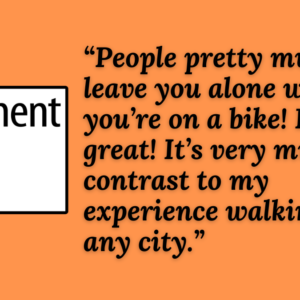I wish I knew more than I do, but housing regulation is a subject which still overwhelms me. Which is why last week’s interview with transportation activist and bike parking expert Chris Smith was so satisfying. Sometimes it’s just nice to hear someone explain things.
The treat on top of the interview was that Smith hopped into the comment section and engaged with a couple folks. It was a good bunch of comments, but when reader “qqq” called the 15-feet-from-the-door alcove requirement for bike parking a “design hurdle” which “clearly was created by people who have never had to design units,” Smith countered that the chair of the commission was an architect.
And then he went on to say, “But I’ll bite, how would you describe a requirement that would ensure space for an actual bicycle?”
OK, this is about as exciting as life gets for me, high drama in the comment section. And qqq’s response shifted my thinking a little. The whole exchange is a good example of how to push back firmly and politely, which is what can happen when knowledgeable people have good faith conversations.
Here’s what qqq wrote:
The fact that someone included similar alcoves in some projects doesn’t mean it’s something that should be turned into a standard requirement, although it could show I was wrong about it being created by people who’ve never designed units.
The first thing I’d get rid of if I were designing a requirement that would ensure space for an actual bicycle would be to get rid of the requirement that it be within 15′ of the unit door. The distance to the door is irrelevant to whether a bike fits in a unit. And although it would be nice if the space were close to the front door, that rule could be (as was, based on comments from architects and developers) a real stumbling block. Deleting it opens up a lot of perfectly good bike storage possibilities.
Like I said, I can’t find the old code language, but I also recall (could be wrong) that the rule required an actual alcove, versus simply requiring space. If that’s true, it could also be difficult to meet without distorting unit designs, and again is irrelevant to whether there is actual space. Again, deleting specific alcove requirements could open up a lot of perfectly good storage possibilities.
I understand that if there are no requirements, developers can simply say there’s space within the unit, without changing their units from what they’d be offering anyway. On the other hand, you can store a bike in quite a small space, which many units do have, and did have when the code didn’t have ANY in-unit bike space requirements.
Lots of people spent lots of time trying to solve this (which I appreciate) so I’m not trying to say I know the best solution better than anyone else. I’m mainly saying that I understand why architects and developers objected to the alcove requirement.
Thank you qqq and Chris. Qqq helped me think like an architect. How would Frank Lloyd Wright feel about a requirement to build an alcove within 15 feet of the door? And there you have it, another thought-provoking comment. The whole thread was good, start at the top.








Thanks for reading.
BikePortland has served this community with independent community journalism since 2005. We rely on subscriptions from readers like you to survive. Your financial support is vital in keeping this valuable resource alive and well.
Please subscribe today to strengthen and expand our work.
Getting rid of bike parking requirements will obviously help solve the housing crisis but if we really want to increase developer’s profits and create housing abundance we should also get rid of additional anti-housing regulations (e.g. installation of smoke alarms, HVAC systems, plumbing, and stair cases [metal poles and ladders are a far more economical way to move from floor to floor)]}. We should also end the disastrous anti-housing abundance fees that block so much new housing (e.g. development review fees, permit fees, and SDCs).
I’m not an architect, but no.
Nor is an alcove a particularly good solution; I wish architects would propose something better rather than nothing at all. I feel there is a win-win in here somewhere, but Rubio chose to make cyclists (and by extension cycling) take the hit to make it look like she’s doing something (even when almost everyone seems to agree the bike parking issue is essentially symbolic compared to the real city impediments to building like SDCs or permitting hell).
Rubio might just be the most anti-environmental pro-environment official in Oregon.
Alcoves can definitely be design hurdles. Also, remember, it’s not just an alcove, it’s an alcove that had to be within 15′ of the front door.
I think they could be perfectly good design solutions, but they’re not the ONLY solution, and not better than some other solutions. I can see architects being frustrated when they had good solutions that didn’t meet the rules, especially when they were better solutions than what meeting the code allowed.
If you’re talking about proposing solutions that are better than alcoves (or closets, which were also an allowable solution), if architects weren’t proposing them it was likely because they weren’t allowable.
If someone wants to propose something that doesn’t meet a building code requirement, the process is often quick and inexpensive. You basically just have to propose something equivalent to the requirement.
It’s more expensive and time-consuming to propose an alternative to a zoning requirement (which bike rules are). And the bike storage requirement was written (as I recall) in a way that, at best, didn’t make it easy to have alternatives approved, even good ones.
If you’re talking about architects proposing a preferable code requirement, I don’t know if any did that or not. I’m guessing some participated in discussions about how to change the code.
I totally agree there are changes to major issues that would have been infinitely more important to developers (SDCs, seismic rules, permitting) than bike storage, and the City chose bike storage because it was easy to water down, especially compared to fixing the big problems, and people in the City didn’t give bike storage the importance it deserved.
What I meant was that the city was obviously willing to be flexible on this item; rather than do away with it altogether, I wish the city had said “bring us your best ideas, we’re willing to change the rules if you propose something better.”
On the other hand, since Rubio was willing to kill the requirement altogether, I can’t really blame builders for “taking the win”. Nothing is stopping them from adding bike alcove equivalents if that’s what they want to do. The problem is that many won’t.
I should be clear that I blame the city, not builders, who were just acting in their own interest, and took the freebie that Rubio handed them.